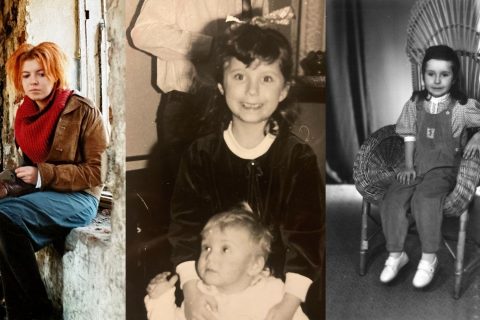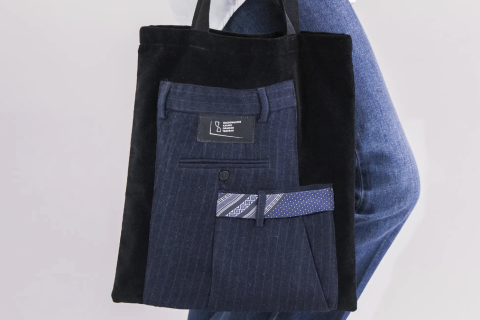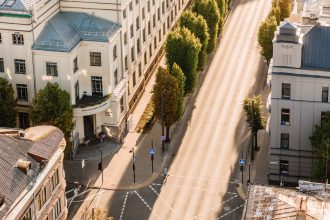Have you heard about the European Climate Pact Community? And about the European Climate Pact itself? In January, sixteen personalities were added to the list of ambassadors of this initiative in Lithuania, who are determined to encourage residents, communities, and organizations to contribute to achieving a climate-neutral Europe by 2050. There are many ways to combat global warming and they range from getting rid of your car to heating your home. But first, we need to start changing our perception of climate change.
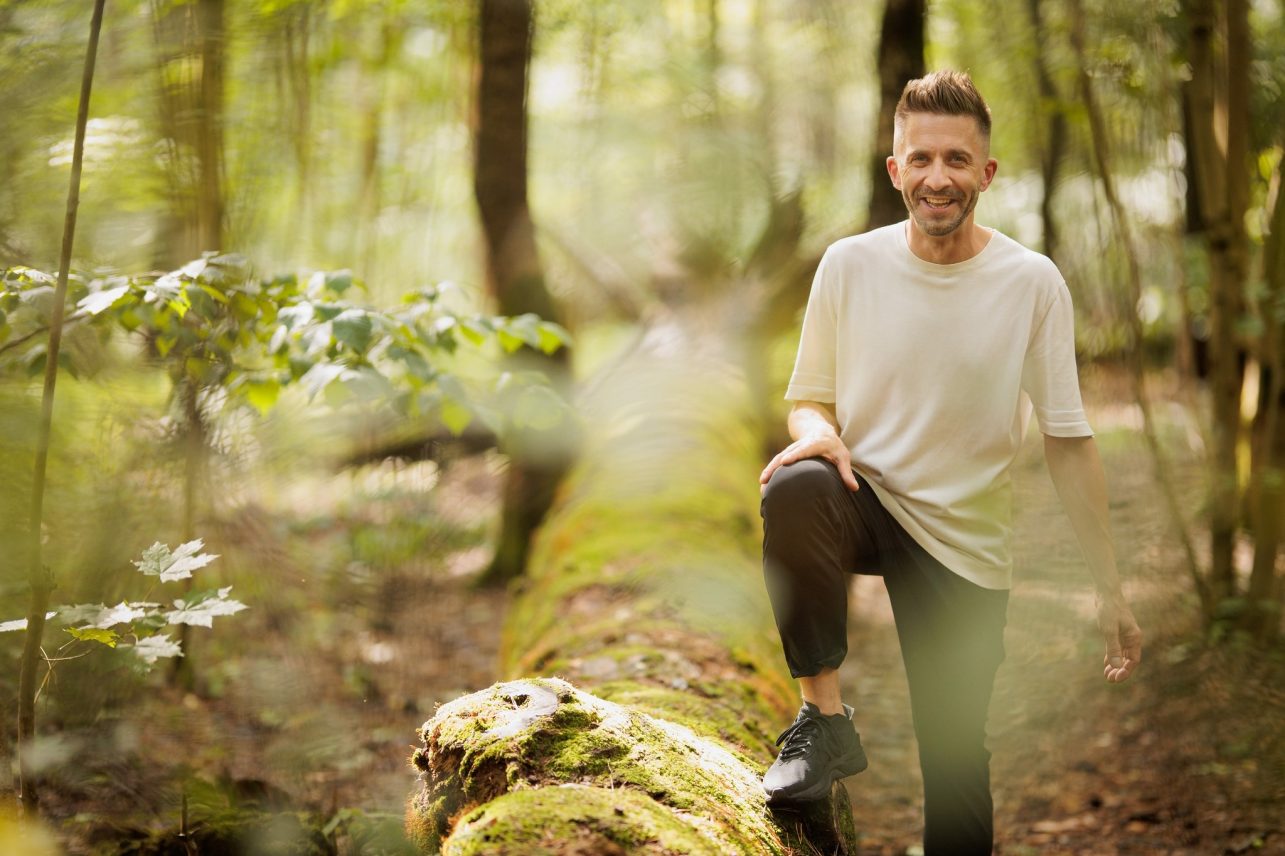
Silvestras Dikčius, who is presented as a climatologist, TV presenter, author of articles, and everyday sustainability educator is among the new ECP ambassadors. Since last September, he is also a student of Vytautas the Great University, although he does not visit Kaunas that often since the lectures for philosophy master’s students are held remotely. Philosophy and climate change are not accidental acquaintances here. “I associate climate change control with changing values, ethical attitudes, and general awareness of the problem,” says the ambassador officially. And before we start our conversation, he adds that this is a public activity, “It is an interesting fact that I am the only man among the new ambassadors. It can be explained by the fact that ecological issues are generally unimportant to men, and women in general are more inclined to engage in social activities.”
Silvestras, you know more about climate change than the average citizen, do you experience the so-called eco-anxiety about it?
Frankly, no. It makes me more curious. My colleagues, and other climatologists, have also said that they do not feel particularly worried. We rationalize everything a lot, after all, we work with scientific data. Of course, I do feel things, but it is more anger towards certain groups in society, frustration, or resentment than anxiety.
It seems to me that eco-anxiety gives birth to activism because in addition to wanting to live more sustainably, you aggressively seek to change society. There are few such people in Lithuania, or they act relatively mildly.
Maybe it is because few people in Lithuania can afford to feel climate anxiety. They are preoccupied with survival. Or maybe, to paraphrase the saying about the grass being greener on the other side, people have more pity for the jungle in Brazil rather than meadows in Lithuania?
It seems to me that we as a country basically live in excess, although, yes, a large part of society is on the poverty line. So, we start looking for problems bigger than our own lives. We start caring about clean water, birds, and nature, which inevitably changes. Thus, a privileged life also brings fears and anxieties, which those who live in poorer countries, who are focused on daily survival, do not really have. Or perhaps they simply do not experience such information overload. A study conducted a couple of years ago revealed that about 40% of the world’s population had never heard of such things as climate change, or global warming. Most likely, they live in countries that will be greatly affected by climate change.
You haven’t had your own car for two and a half years; you walk a lot. You talk about this and other habits in podcasts and on social media. Do you want to change other people’s lives?
Not having a car is more of an experiment. To be honest, it’s difficult enough in Lithuania without one, so I’m not saying that I will never ever have a car. I’m just interested in exploring other ways of moving. It wasn’t a conscious effort to be sustainable, like many of my decisions that are, in the end, sustainable.
But it’s not so easy to inspire others to change. I think people decide for themselves whether they need or don’t need a car. But yes, sometimes I get comments that the Five Kilometers podcast hosted by Ignas Klėjus and me, has inspired people to walk more. It’s so nice to see a positive change in someone’s life because of what you said. A more radical effect would probably require my greater involvement and a more serious strategy.
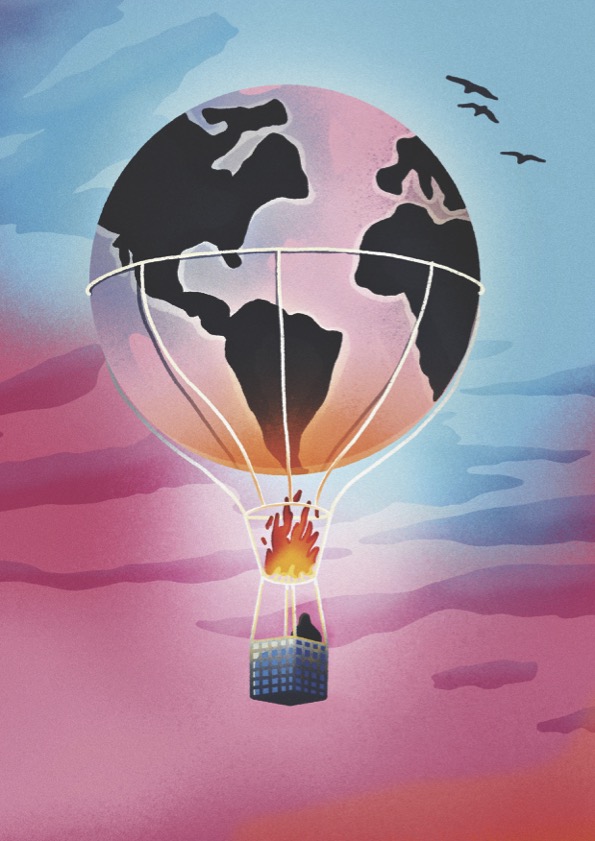
There are more podcasts, ambassadors, and strategies. Does it work though? It doesn’t look like it does when you see the crowded parking lots near shops.
I would agree. Perhaps a change can be felt in the bubbles of Kaunas and Vilnius. People shop in second-hand clothing stores, go for walks, and have reusable cups because it is fashionable, but also sustainable. I like it when the sustainability element is secondary, it’s more efficient that way. But the general situation in Lithuania really does not change much. People continue to buy cheap items – that are bound to break soon enough – in large quantities. The economy is growing, so consumption is also growing. It would be sad if it started to shrink, even though we would use less. Travel had stopped for some time, but now people travel even more than before, and the more they earn, the further and more often they travel.
Overall, consumption is still a huge aspiration. Only a small part of society becomes surfeited with consumption, realizes that maybe they don’t need that much, and changes their lifestyle. For example, I decided to work less and therefore consume less, but it is related to the fact that I decided to go back to school and do a master’s in philosophy.
Although you say you don’t experience eco-anxiety, there must be an important reason for studying philosophy.
It is an expression of freedom. As an adult, I can decide of my own free will that I want to study philosophy now. I already have a bachelor’s in philosophy. I entered the study program when I was 27 and already had a master’s in natural sciences. This choice was driven more by existential than eco-anxiety. We all want to find answers to questions that plague us, to test the limits of our minds, and I encountered this very quickly in these studies. I really wanted to have that real humanities experience in my undergrad, but I didn’t connect it with my first choice, the natural sciences. It wasn’t until later that I realized how everything was connected, for example when thinking about ethics. So now I understand that philosophy has a lot to offer when it comes to climate change. Of course, you hit a wall: a consumer society is one of the factors that will prevent us from solving the climate crisis. Despite the pessimism, I do manage to find answers to important questions.
It would be interesting to hear your opinion about how artists manage to excite the public using uncomfortable topics. This month, the opera Sun and Sea is shown in Kaunas. Almost five years have passed since its triumph at the Venice Biennale, and it is still relevant, although I have not found a study of its educational impact.
I think it’s a necessary path. There is plenty of scientific information, but its dry presentation obviously does not work. Therefore, it is necessary to look for effective ways of communication, and art is one of them. It shouldn’t be a direct representation of data; boring graphs aren’t enough to create a field of knowledge. After all, climate change affects basically all aspects of our lives. It’s not just consumption or non-consumption, warm or cold. These are primarily questions of values, which also include geopolitics: which countries we are friends with, and who we buy oil from.
By the way, Eglė Narbutaitė’s exhibition Pavėsis (shade) was running in Vilnius, Arka Gallery until February 11. It contained a lot of gentle criticism of capitalism, reflection on climate change as well as very fun irony. I think this is important when talking about serious topics because often eco art is an attempt to scare people. Another factor contributing to the success of Sun and Sea is the fact that this work is neither preachy nor intimidating.
Maybe that’s why many people don’t like Greta Thunberg so much. She is really very angry.
Yes, and ‘dislike’ is too soft a word. She is strict and requires extreme changes. And people tend to defend their territory, worldview, and values. When someone encroaches upon them, we oppose it. Greta demands to change the way we live, what we strive for, and what our desires are – after all, everyone wants to be rich and successful. And she says that for the sake of the climate, we have to give it up. How can someone like that? No, people like comedians and silly jokes on Instagram, and eco-activists – since Greenpeace – have been talking about very complex issues that have no room for jokes. Add war, artificial intelligence, and other threats, and there is really no room left in one’s mind for birds and animals. So, activists aren’t liked, and I don’t think that’s going to change, but it’s good that they’re there, making uncomfortable points and muddying the waters. There must be room for that in a democracy.
What would you say to sceptics who claim that Lithuania is definitely not getting warmer?
Well, it is getting warmer. When I was born in 1980, summers were colder. And even more so earlier. Winter started in November; the snow melted at the end of March. People remember that “it was hot then, too” but don’t remember exactly how much. Also, we forget the bad things and remember the good. If you were born in April and it was 22 degrees at that time, you will remember that, even though there was mostly sleet during your birthday. Our memory tends to erase the sleet.
We also have secondary issues that come out of climate change, for example, refugees. A classic example could be the Syrian war, which was triggered by drought. People had to move to the city. Friction arose between ethnic groups; civil war broke out. The result is five million refugees. They are treated as war refugees, but analysts agree that the root cause of this process was drought caused by climate change.
However, will there come a time when it will no longer be possible to live in Lithuania?
It’s an extremely complicated question, but I would say that people will be able to live here for a long time. We are in a very safe area in terms of climate. Yes, 2023 was the warmest year globally, and the jump was bigger than expected, and scientists don’t yet have a clear answer as to why it happened. However, life in other parts of the world will become difficult much faster than in Lithuania. There already are problematic places on the African continent where the temperature rises to 50 degrees Celsius, but people survive and adapt. Lithuania will get warmer, but the winter will not disappear. There is always frightening information that the level of the Baltic Sea will rise, Žemaitija will become an island, and Kaunas will sink, but journalists forget to mention that this will happen maybe in some thousands of years, if the Arctic and Greenland ice sheets completely melt.

